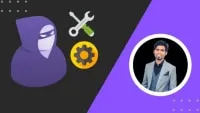
Hands-on with Top Ethical Hacking Tools 
Gain valuable insight into the world of ethical hacking with hands-on experience of the top tools available. Enhance your cybersecurity skillset and accelerate your journey with these powerful tools. ▼
ADVERTISEMENT
Course Feature
![]() Cost:
Cost:
Free
![]() Provider:
Provider:
Udemy
![]() Certificate:
Certificate:
No Information
![]() Language:
Language:
English
Course Overview
❗The content presented here is sourced directly from Udemy platform. For comprehensive course details, including enrollment information, simply click on the 'Go to class' link on our website.
Updated in [April 29th, 2023]
This course provides an introduction to ethical hacking and penetration testing. Participants will learn how to use top ethical hacking tools such as Nessus Scanner for web application security testing, OpenVAS Scanner for host scan, Nmap for host and web application security scanning, DirBuster, Recon-ng Tool, Metasploit Framework, Burp-Suite, and Browser Exploitation Framework (BeEF). Through hands-on activities, participants will gain an understanding of the tools and techniques used by ethical hackers and penetration testers.
[Applications]
After completing this course, participants can apply their knowledge to assess the security of their own systems and networks. They can use the tools and techniques learned in the course to identify and mitigate security vulnerabilities. Additionally, they can use the knowledge gained to help organizations develop secure systems and networks. Furthermore, they can use the tools and techniques to help organizations develop secure web applications and to detect malicious activity on their networks.
[Career Paths]
1. Cyber Security Analyst: Cyber Security Analysts are responsible for monitoring and protecting an organization's computer networks and systems from cyber-attacks. They use a variety of tools and techniques to identify potential threats, analyze security risks, and develop strategies to mitigate those risks. As the demand for cyber security professionals continues to grow, the need for Cyber Security Analysts is expected to increase.
2. Penetration Tester: Penetration Testers are responsible for testing the security of an organization's networks and systems. They use a variety of tools and techniques to identify potential vulnerabilities and develop strategies to mitigate those vulnerabilities. As the demand for cyber security professionals continues to grow, the need for Penetration Testers is expected to increase.
3. Ethical Hacker: Ethical Hackers are responsible for testing the security of an organization's networks and systems. They use a variety of tools and techniques to identify potential vulnerabilities and develop strategies to mitigate those vulnerabilities. As the demand for cyber security professionals continues to grow, the need for Ethical Hackers is expected to increase.
4. Security Engineer: Security Engineers are responsible for designing, developing, and implementing security solutions for an organization's networks and systems. They use a variety of tools and techniques to identify potential threats, analyze security risks, and develop strategies to mitigate those risks. As the demand for cyber security professionals continues to grow, the need for Security Engineers is expected to increase.
[Education Paths]
1. Bachelor of Science in Cyber Security: This degree path focuses on the technical aspects of cyber security, such as network security, cryptography, and malware analysis. It also covers topics such as risk management, incident response, and digital forensics. This degree path is becoming increasingly popular as the demand for cyber security professionals grows.
2. Master of Science in Information Security: This degree path focuses on the management aspects of cyber security, such as policy development, risk management, and compliance. It also covers topics such as network security, cryptography, and malware analysis. This degree path is becoming increasingly popular as organizations look to hire professionals with the skills to manage their cyber security programs.
3. Doctor of Philosophy in Cyber Security: This degree path focuses on the research aspects of cyber security, such as developing new technologies and techniques for protecting networks and systems. It also covers topics such as network security, cryptography, and malware analysis. This degree path is becoming increasingly popular as organizations look to hire professionals with the skills to develop new technologies and techniques for protecting their networks and systems.
4. Master of Business Administration in Cyber Security: This degree path focuses on the business aspects of cyber security, such as risk management, policy development, and compliance. It also covers topics such as network security, cryptography, and malware analysis. This degree path is becoming increasingly popular as organizations look to hire professionals with the skills to manage their cyber security programs from a business perspective.
Course Syllabus
Nessus Scanner: Complete Host Scan
Complete host Scan with OpenVAS
Nmap | Host Discovery
HTTP Enumeration with Nmap tool
DirBuster for Sensitive Data Leakage
Recon-ng tool | Discovering Email Accounts
Pros & Cons

Very good and helpful

Boosts knowledge

Precise and easy to understand

Good for beginners

Too short

No certificate provided
Course Provider

Provider Udemy's Stats at AZClass
Discussion and Reviews
0.0 (Based on 0 reviews)
Explore Similar Online Courses

Easy Vlogging : Making Interactive Self-introduction Videos

Basic Recommender Systems

Python for Informatics: Exploring Information

Social Network Analysis

Introduction to Systematic Review and Meta-Analysis

The Analytics Edge

DCO042 - Python For Informatics

Causal Diagrams: Draw Your Assumptions Before Your Conclusions

Whole genome sequencing of bacterial genomes - tools and applications

Ryan Montgomery - #1 Ethical Hacker Who Hunts Child Predators Catches One Live On Podcast SRS #56

Become Master in Ethical Hacking with Android (without Root)


Start your review of Hands-on with Top Ethical Hacking Tools